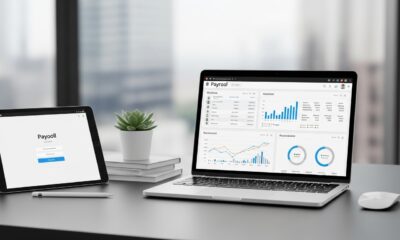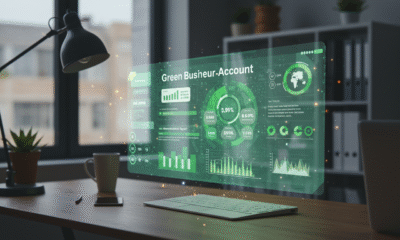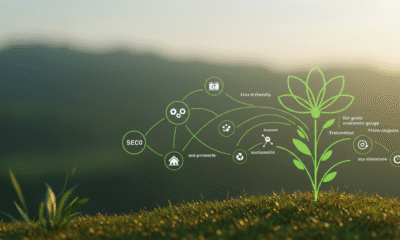

Features
Alternative Financing Ideas for Green Businesses that Shun Banks
There are a number of great green businesses that have done wonders for helping the environment. Unfortunately, there are many other green companies that are struggling to stay above water.
It is important to recognize that small businesses and the self-employed have much more difficulty accessing financing than larger companies. Moreover, due to their lower bargaining power, they often find themselves suffocated by the payment conditions imposed on them by their suppliers and customers.
Green businesses in particular, often have trouble getting access to financing. They are usually newer than companies with less of a commitment to sustainability. The OECD addressed this in their article Green financing: Challenges and opportunities in the transition to a clean and climate-resilient economy.
Fortunately, there are ways to get financing, such as using apps to get a quick cash advance. You will discover there are many benefits of these apps if you use them properly.
Keep in mind that you can still try to get small business loans. In some cases, they are your best option. However, you need to know when to pursue other forms of financing if they are off the table.
Getting financing for your green business
Fortunately, there are some steps that green businesses can take to improve access to financing. You will want to take the following measures if you want to increase your odds of getting funding for your eco-friendly business.
Have a policy to address customers who pay late
Green businesses need to have a system in place for dealing with customers that pay late. If you can’t close many of your accounts receivable, then you are less likely to have a sufficient cash flow to get creditors on board.
In theory, companies are required by law not to impose payment terms longer than 60 days. But some companies know how to turn the situation around. They use tricks such as registering the invoice in their systems much later than the date of receipt (and count the 60 days from then) or simply pretend that there is a commercial dispute to gain time.
In theory, the supplier could sue the customer for non-compliance with the agreed terms. But what supplier is going to enter into legal proceedings with one of its main customers for a few days’ delay? The balance of power is in favor of the large company, and many SMEs and freelancers grudgingly accept the situation.
Show you can deal with suppliers demanding quick payment
Lenders also want to see that you have a good track record for paying your suppliers on time. If you have been struggling to do so, then you need to find a way to improve the situation, so you can show that your company is able to meet its obligations.
However, you can’t pay too early, especially as a newer, green business. Paying early and getting paid late is not good for cash flow.
Clearly if a small business must advance expenses early and then takes two or three months to get paid for their work, their financial situation is going to be very complicated. Many SMEs suffer from liquidity problems due to this double effect, especially when they are caught between powerful suppliers and powerful customers.
Shortage of funding to finance projects
The other problem that SMEs often face is that they do not have a lot of collateral to support their financing requests. They may have a very good investment project, but the policy of many banks and financing companies is often too strict, and they do not grant the money needed to invest.
You will have to face the reality that many traditional lenders are not going to particularly supportive for green businesses. Even if they sympathize with your objectives, they recognize that eco-friendly business ideas are risky, so they must see that you have a solid track record.
Alternative financing options for green startups
There are alternative financing options that you can try as a green business. Some of the ideas are listed below.
Financing projects in a more creative way
You have probably heard of crowdfunding. It is a format that works very well, but it must be recognized that it is limited to some economic activities. If you do not sell products or services related to entertainment or culture, it is likely that you are not going to have much success on this type of platform.
Eco-friendly businesses should definitely consider the benefits of crowdfunding. There are even some crowdfunding platforms specifically for eco-friendly startups. The Cornell Daily Sun reported last year that an alumni created such a crowdfunding startup called Greenfundr.
Use apps to get quick cash
There are a number of new apps that you can use to get quick access to cash. Many green businesses can consider the benefits of them.
Finding solutions outside the banking system
Although banks account for a significant portion of business financing, they are not the only sources of financing for SMEs. There are non-bank companies, such as DCF, that offer solutions ranging from note discounting to factoring to project finance.
Redesigning the business model
To escape the liquidity trap, you can think of a different way of working. You should consider an example, which radically changes the cash flow situation of a company. Instead of working by invoicing products or services for each commercial operation, you can invent a subscription system.
The great advantage of a subscription business model is that you disconnect the billing cash flow from the consumption flow of products and services. What’s more, usually, with a subscription system you get paid before you start providing services.
Look for alternative suppliers and diversify customers
Eco-friendly companies should also consider the merits of working with alternative suppliers. They have fewer options to work with, since they have to be more discerning about companies based on their ecological footprint. However, there are still options to look for.
If you depend on a supplier that requires you to pay in cash, it might be worthwhile to look for other companies to buy the products or services your business needs. The idea is to try to get better payment terms, even if that means having slightly worse margins. It all depends, of course, on how critical your company’s financial situation is, and the relative cost of margin loss compared to the cost of financing.
If you depend a lot on a customer who pays you late, it pays to look for other customers, to diversify your options. I know it costs a lot, but it pays to dedicate your efforts to gradually become less dependent on a single company.


 Features11 months ago
Features11 months agoEco-Friendly Cryptocurrencies: Sustainable Investment Choices

 Energy11 months ago
Energy11 months agoThe Growing Role of Solar Panels in Ireland’s Energy Future

 Energy10 months ago
Energy10 months agoGrowth of Solar Power in Dublin: A Sustainable Revolution

 Energy10 months ago
Energy10 months agoRenewable Energy Adoption Can Combat Climate Change



























